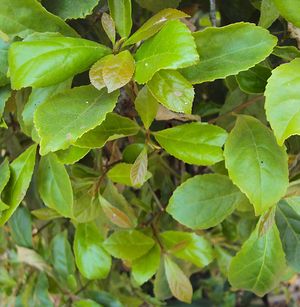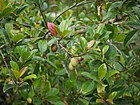Note: This is a project under development. The articles on this wiki are just being initiated and broadly incomplete. You can Help creating new pages.
Difference between revisions of "Elaeocarpus serratus - Aravata"
(→External Links) |
(→Common names) |
||
| (8 intermediate revisions by 2 users not shown) | |||
| Line 13: | Line 13: | ||
==Common names== | ==Common names== | ||
| − | {{Common names|kn=|ml=|sa= | + | {{Common names|kn=|ml=|sa=Chiribilva, Aravata|ta=Krai, Ulankarai|te=|hi=|en=Ceylon Olive}} |
==Properties== | ==Properties== | ||
| Line 37: | Line 37: | ||
==Identification== | ==Identification== | ||
===Leaf=== | ===Leaf=== | ||
| − | {{Leaf| | + | {{Leaf|Simple|Spiral|Leaves simple, alternate, spiral, clustered at twig ends}}.<ref name="Leaf"/> |
===Flower=== | ===Flower=== | ||
| − | {{Flower|Inflorescence|2-4cm long| | + | {{Flower|Inflorescence|2-4cm long|White||Inflorescence racemes; flower petals white, laciniate, anthers ciliate}} |
===Fruit=== | ===Fruit=== | ||
| − | {{Fruit||7–10 mm (0.28–0.4 in.) long pome|| | + | {{Fruit||7–10 mm (0.28–0.4 in.) long pome|||}} |
===Other features=== | ===Other features=== | ||
==List of Ayurvedic medicine in which the herb is used== | ==List of Ayurvedic medicine in which the herb is used== | ||
| − | |||
==Where to get the saplings== | ==Where to get the saplings== | ||
| Line 62: | Line 61: | ||
==Photo Gallery== | ==Photo Gallery== | ||
<gallery class="left" caption="" widths="140px" heights="140px"> | <gallery class="left" caption="" widths="140px" heights="140px"> | ||
| − | CeylonOliveVeralu.jpg | + | CeylonOliveVeralu.jpg|Fruits |
| − | Elaeocarpus serratus (8582717791).jpg | + | Elaeocarpus serratus (8582717791).jpg|Field |
| − | Elaeocarpus serratus 01.JPG | + | Elaeocarpus serratus 01.JPG|Buds |
| − | Elaeocarpus serratus 03.JPG | + | Elaeocarpus serratus 03.JPG|Leaves |
| − | Elaeocarpus serratus 04.JPG | + | Elaeocarpus serratus 04.JPG|Flower |
| − | + | ||
| − | |||
| − | |||
</gallery> | </gallery> | ||
| Line 75: | Line 72: | ||
<references> | <references> | ||
| − | <ref name="chemical composition">[https://www.tandfonline.com/doi/abs/10.1080/14786419.2010.551514?scroll=top&needAccess=true&journalCode=gnpl20 | + | <ref name="chemical composition">[https://www.tandfonline.com/doi/abs/10.1080/14786419.2010.551514?scroll=top&needAccess=true&journalCode=gnpl20 Chemical investigation]</ref> |
| − | <ref name="Leaf">[https://indiabiodiversity.org/species/show/11305 | + | <ref name="Leaf">[https://indiabiodiversity.org/species/show/11305 Morphology]</ref> |
| − | <ref name="How to plant/cultivate">[http://tropical.theferns.info/viewtropical.php?id=Elaeocarpus+serratus | + | <ref name="How to plant/cultivate">[http://tropical.theferns.info/viewtropical.php?id=Elaeocarpus+serratus Cultivation Details]</ref> |
</references> | </references> | ||
| Line 88: | Line 85: | ||
[[Category:Herbs]] | [[Category:Herbs]] | ||
[[Category:Ayurvedic herbs that don't have seed photos]] | [[Category:Ayurvedic herbs that don't have seed photos]] | ||
| + | [[Category:Elaeocarpaceae]] | ||
Latest revision as of 18:00, 16 October 2020
Elaeocarpus serratus is a tropical fruit found in the Indian Subcontinent, Indo-China and South East Asia. It is an ornamental medium sized tree indigenous to Sri Lanka, producing smooth, ovoid green fruits.
Contents
- 1 Uses
- 2 Parts Used
- 3 Chemical Composition
- 4 Common names
- 5 Properties
- 6 Habit
- 7 Identification
- 8 List of Ayurvedic medicine in which the herb is used
- 9 Where to get the saplings
- 10 Mode of Propagation
- 11 How to plant/cultivate
- 12 Commonly seen growing in areas
- 13 Photo Gallery
- 14 References
- 15 External Links
Uses
Dandruff, Abscesses, Fungal infections, Joint swelling, Eczema, Perspiration problems.
Parts Used
Chemical Composition
Chemical investigation of the leaves of Elaeocarpus serratus yielded myricitrin (1), mearnsetin 3-O-β-D-glucopyranoside (2), mearnsitrin (3), tamarixetin 3-O-α-L-rhamnopyranoside[1]
Common names
| Language | Common name |
|---|---|
| Kannada | |
| Hindi | |
| Malayalam | |
| Tamil | Krai, Ulankarai |
| Telugu | |
| Marathi | NA |
| Gujarathi | NA |
| Punjabi | NA |
| Kashmiri | NA |
| Sanskrit | Chiribilva, Aravata |
| English | Ceylon Olive |
Properties
Reference: Dravya - Substance, Rasa - Taste, Guna - Qualities, Veerya - Potency, Vipaka - Post-digesion effect, Karma - Pharmacological activity, Prabhava - Therepeutics.
Dravya
Rasa
Madhura (Sweet)
Guna
Guru (Heavy), Snigadh (Unctuous), Sneha(Oily)
Veerya
Sheet (Cold)
Vipaka
Madhura (Sweet)
Karma
Vata, Pitta
Prabhava
Rejuvenation,Supplement
Habit
Identification
Leaf
| Kind | Shape | Feature |
|---|---|---|
| Simple | Spiral | Leaves simple, alternate, spiral, clustered at twig ends |
.[2]
Flower
| Type | Size | Color and composition | Stamen | More information |
|---|---|---|---|---|
| Inflorescence | 2-4cm long | White | Inflorescence racemes; flower petals white, laciniate, anthers ciliate |
Fruit
| Type | Size | Mass | Appearance | Seeds | More information |
|---|---|---|---|---|---|
| 7–10 mm (0.28–0.4 in.) long pome | {{{6}}} |
Other features
List of Ayurvedic medicine in which the herb is used
Where to get the saplings
Mode of Propagation
How to plant/cultivate
Members of this genus generally grow well in full sun to moderate shade, requiring a fertile, moist but well-drained soil[3]
Commonly seen growing in areas
Photo Gallery
References
External Links
- Ayurvedic Herbs known to be helpful to treat Dandruff
- Ayurvedic Herbs known to be helpful to treat Abscesses
- Ayurvedic Herbs known to be helpful to treat Fungal infections
- Ayurvedic Herbs known to be helpful to treat Joint swelling
- Ayurvedic Herbs known to be helpful to treat Eczema
- Ayurvedic Herbs known to be helpful to treat Perspiration problems
- Herbs with Roots used in medicine
- Herbs with Leaves used in medicine
- Herbs with common name in Tamil
- Herbs with common name in Sanskrit
- Herbs with common name in English
- Habit - Evergreen tree
- Index of Plants which can be propagated by Seeds
- Index of Plants which can be propagated by Cuttings
- Herbs that are commonly seen in the region of Tropical area
- Herbs
- Ayurvedic herbs that don't have seed photos
- Elaeocarpaceae





